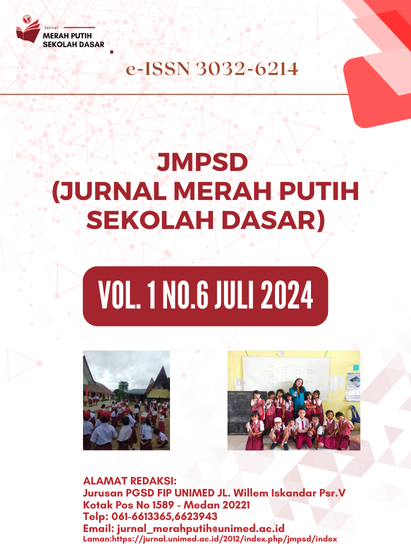PENGARUH MODEL PEMBELAJARAN WORD SQUARE BERBASIS SAINTIFIK TERHADAP HASIL BELAJAR IPAS SISWA KELAS V
DOI:
https://doi.org/10.24114/jmpsd.v1i6.59160Abstract
This study aims to determine the effect of the scientific-based Word square learning model on the learning outcomes of IPAS class V students of SDS Ummi Fatimah. This research is a quantitative study using an experimental method with a type of Pre-Experimental Design with a One Group Pretest-Posttest Design design. The population is all fifth grade students of SDS Ummi Fatimah in the 2023/2024 academic year, totaling 50 students. The sample in this study was class V-A with 25 students. Data collection was carried out using test, interview, observation and documentation techniques. The technical test is in the form of multiple choice questions which have first been tested and analyzed with validity and reliability. Data analysis techniques in the form of descriptive and inferential statistical analysis.The results of this study indicate that there is a significant effect on the scientific-based Word square learning model on the learning outcomes of IPAS class V students of SDS Ummi Fatimah, seen from the average value where the pretest value is 54.4 to 75.4 with the highest value of 95 obtained by 2 students and the lowest value is 60 obtained by 1 student. Calculation of the results of hypothesis testing shows the value of t-count with t-table obtained t-count> t-table, namely the value of 7.81> 1.711, then the null hypothesis (H0) is rejected and the alternative hypothesis (Ha) is accepted, which means that there is an effect of the scientific-based Word square learning model on the learning outcomes of IPAS class V students of SDS Ummi Fatimah T.A 2023/2024.Keywords: Word Square Learning Model, Scientific Approach, and Learning Outcomes.References
Trianto. (2014). Model Pembelajaran Terpadu; Konsep, Strategi dan Implementasinya dalam Kurikulum Tingkat Satuan Pendidikan (KTSP),. Jakarta: PT Bumi Aksara.
Fatah, P. R., Kisai, A. A., Nurkholis, & Labudasari, E. (2023). Peningkatan Hasil Belajar Ipas Melalui Model Pembelajaran Problem Based Learning (PBL) Pada Siswa Kelas IV SDN 1 Cirendang Kecamatan Kuningan Kabupaten Kuningan. El-Mubib : Jurnal Pemikiran& Penelitian Pendidikan Dasar, 7(1), 29-40.
Amalia , P. I., Nurhasanah, & Hadi , H. S. (2021). Pengaruh Model Word Square Terhadap Hasil Belajar Muatan IPS Siswa Kelas IV Sekolah Dasar. PRIMARY: Jurnal Pendidikan Guru Sekolah Dasar, 10(1), 202-212.
Sugiyono. (2013). Metode Penelitian Kuantitatif Kualitatif dan R&D (XXIV ed.). Bandung: Alfabeta.
Sugiyono. (2016). Metode Penelitian Pendidikan (Pendekatan Kuantitif, Kualitatif dan R & D). Bandung: Alfabeta.
Sugiyono. (2018 ). Metode Penelitian Kuantitatif. Bandung : Alfabeta.
Suhelayanti, Z, S., Rahmawati, I. Y., Rewini, W. K., Suleman, N., Nasbey, H., . . . Anzelina, D. (2023). Pembelajaran Ilmu Pengetahuan Alam dan Sosial (IPAS). Langsa: Yayasan Kita Menulis.
Downloads
Published
Issue
Section
License
Copyright (c) 2024 Jurnal Merah Putih Sekolah Dasar

This work is licensed under a Creative Commons Attribution-ShareAlike 4.0 International License.

